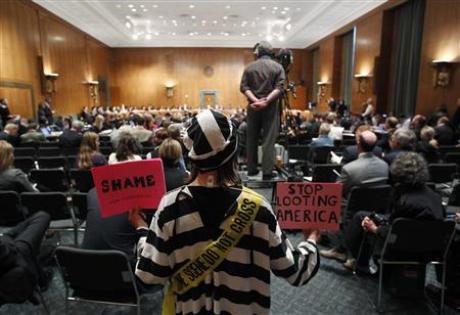
Ethics Sold Short at Goldman Sachs
Ethics Sold Short at Goldman Sachs
Posted On: Wednesday, April 28, 2010
The good news is that ethics was on the front burner April 27, 2010 when U.S. Senators grilled current and former Goldman Sachs executives about Goldman’s role in the financial crisis.
Questions about how Goldman resolves conflicts of interest, handles transparency, whether executives believe the firms’ incentives led to ethical behavior, what Goldman’s code of conduct is, and how executives view their ethical responsibility to clients were issues that senators kept raising, dissatisfied with the answers received.
The Tiffany reputation Goldman has built over 140 years took a beating during the nearly 11-hour hearing of the U.S. Senate Permanent Subcommittee on Investigations.
The most graphic anti-Goldman sentiment was expressed by protesters dressed in prison costumes, draped with crime scene tape, and carrying signs saying “Shame.” They paraded around the hearing room during brief recesses.
Seven current and former Goldman executives including CEO and Chairman Lloyd Blankfein testified, all reinforcing each others’ sentiments that Goldman had behaved appropriately, sidestepping questions about moral obligations, and disputing the facts in the SEC fraud charges.
The hearing exposed an abundance of red flags, some seemed unique to Goldman; others are industry wide. They include:
- Goldman’s 14 Business Principles were described as their code of conduct — as if saying “Integrity and honesty are at the heart of our business” and “we expect people to maintain high ethical standards” makes it so. It doesn’t.
- The Principles also affirm that “our clients’ interest always come first.” However, using Goldman’s own documents, senators repeatedly challenged that assertion, citing apparent conflicts of interest when Goldman acted as market maker and clients’ interests didn’t come first.
- The market maker role was also where Goldman’s actions appeared the most vulnerable to ethical scrutiny.
- Fabrice Tourre, named specifically in the SEC suit and discussed in an earlier column, rejected any notion that he had done anything wrong. No one seemed to think they had done anything wrong; the system worked. Questions about ethics were parried back with platitudes.
- When Sen. Tom Coburn (R-OK) asked “could a non-biased person look at the facts and raise ethical questions on a deal,” he didn’t get an answer, leading the senator to conclude, “there is a question of unethical behavior here.”
- The various roles that rating agencies play, the compensation they receive for rating a Goldman product and the inherent conflicts of interest raised were not seen by those testifying as an issue.
- After a few hours of Blankfein’s testimony, it was unclear what ethical standards Goldman stood for, and what Blankfein’s tone at the top really was.
The televised hearing raised questions, many of which remain unanswered, evidence of the complexity facing legislators working on regulatory reform. However, the intense scrutiny Goldman faces takes the ethical issues identified in one Wall Street icon and illuminates industry-wide ethical issues.
Before Goldman’s next public testimony, whether in Congress or in court, it would be a good first step for them to be able to articulate what they mean by “integrity and honesty are at the heart of our business.” You can’t use what you can’t define.
Posts by Category
Archive
Most Recent
Gael has proven to be a source of thoughtful and actionable advice on issues related to corporate culture and ethics. Her academic knowledge is a useful supplement to her practical experience and tailored advice.


[…] Goldman and BP were required to testify before U.S. congressional committees and covered endlessly by […]
[…] mantra hovered over the 2008 global economic meltdown. Goldman Sachs appeared among the most visible of the standard bearers for greed. In the meltdown’s […]
[…] an almost sociopathic disregard for customers that seem a hallmark of the meltdown. From Lehman to Goldman Sachs customers were objectified, not real flesh and blood, the way a hit and run driver leaves the scene […]
[…] « Character Counts, Just Not So Much at Nike: Ben Roethlisberger’s Fumble The Week in Ethics: Ethics Sold Short at Goldman Sachs […]
[…] Middle East and Africa — left the firm yesterday. His message was that the SEC investigation, Congressional hearings, the firm’s “rigorous self examination” and efforts to restore reputation and […]